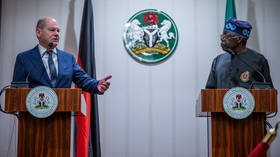Germany to start negotiations with Tanzania on colonial legacy
Relations between Berlin and its former colony are overshadowed by atrocities committed in the past, the German president has said
Germany will open talks with Tanzania to address the legacy of its colonial rule in the East African country, then known as Tanganyika, President Frank-Walter Steinmeier said on Tuesday.
“We must not forget the past,” said Steinmeier after meeting his counterpart President Samia Suluhu Hassan in Dar es Salaam as part of a three-day visit to the country.
Tanzania, which was a German colony from 1885 to 1918, initiated legal action against the German government in 2017. The African nation is seeking justice for tens of thousands of people who were tortured and killed by German soldiers during the Maji Maji rebellion of 1905-1907. The majority of Tanzanians died of starvation after German troops deliberately targeted local food sources as punishment for opposing colonial rule.
On Tuesday, Steinmeier claimed that relations between his country and Tanzania had been “overshadowed by atrocities” committed during the three decades of German colonial occupation.
“It is important to me that we come to terms with this dark chapter, that we come to terms with it together,” he said.
The German leader also announced plans to meet people affected by the Maji Maji rebellion, adding that Berlin was open to cooperating with Dar es Salaam on the “repatriation of cultural property and human remains.”
Tanzanian politicians and activists have been demanding compensation and the repatriation of human remains from their country, which are currently on display in museums in Germany.
Tanzania’s president confirmed that her “detailed” talks with Steinmeier had included starting “negotiations to see how we are going to agree on the German colonial legacy.”
Germany apologized to Namibia (formerly South West Africa) in 2021, admitting to genocide against the Herero and Nama peoples between 1904 and 1908. German soldiers killed around 65,000 Herero and 10,000 Nama tribespeople following a revolt against colonial land seizures. Berlin announced a reconciliation agreement with Namibia, including funding projects worth more than €1 billion ($1.05 billion) as reparation for the incident, which is viewed as the first genocide of the 20th century.
Steinmeier is scheduled to visit Zambia from Wednesday to Friday as part of his African tour. The trip will be the first by a German federal president to the southern African country, according to Steinmeier’s office.
Meanwhile, Britain’s King Charles, who arrived in Kenya on Tuesday for a four-day state visit, has admitted that “abhorrent and unjustifiable acts of violence” were committed against Kenyans, who fought a “painful struggle for independence and sovereignty,” though no apologies were made.
The UK is being pressured by its former colony, which it ruled between 1901 and 1960, to apologize and pay reparations for abuses committed there, including the killing of thousands of Kenyans who protested against colonialism.
You can share this story on social media:








Comments are closed.